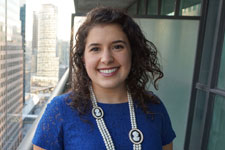Idea may help translate digital world for all
By Paul Mayne

With just the click of a button, a complex medical journal or government website will become crystal clear in an instant if one Western alumna has her way.
Melissa Kargiannakis, BHSc’12, MHIS’15, has created Heuristext, an online tool that customizes a webpage to the viewer’s reading level. Imagine Google Translate, except instead of translating across different languages, Heuristext adapts information to different reading levels. Her idea has caught the interest of Silicon Valley, and now has the opportunity to make a difference in Canada and abroad, thanks to its acceptance into an elite accelerator.
Kargiannakis said her ‘a-ha moment’ for the project came while sitting in a knowledge translation class in 2013. “We were discussing the importance of getting academic literature out to the public; it has very important information that can affect people’s lives and well-being,” Kargiannakis said.
On one hand, academic writing can be intense, she added. On the other, you have newspaper articles that sometimes don’t properly consider the research methods used in the article, which impacts the results and information being put forth to the public.
“In between those two polarized versions there is nothing but this huge gap. It was a very ‘a-ha moment’ in the class. I never said anything out loud. I was just scribbling away in my notebook,” she said. “What I had in mind was a scaled approach that would build a bridge between these two polarizing versions, so that more people are reading academic literature and it would make those newspaper articles as lot more accurate because it’s scaled.”
This led the Health Information Sciences graduate student to create Heuristext.
From the word ‘heuristic’ – to enable a person to discover or learn something for themselves – Heuristext empowers the average Internet user, of any age and reading ability, to understand online information and, hopefully, reduce the harm misinformation can cause, particularly as it relates to health matters.
According to the Canadian Literacy and Learning Network and the U.S. National Center for Education Statistics, nearly half of adults are considered ‘low-literate,’ meaning they lack certain reading, writing and computational skills necessary for everyday life. They can read ‘a little,’ but not well enough to fill out an application, a food label or simple story.
Kargiannakis said imagine your 70-year-old mother just found out she has diabetes. The first thing she may do is turn to the Internet to learn more about the disease. She will come across words like ‘nephropathy,’ ‘glomerulosclerosis’ and ‘albuminuria.’ These words only make a nerve-racking situation worse.
“Not being able to fully understand health information is frustrating, costly and can have dramatic impacts on patient’s outcomes,” said Kargiannakis, who already has a research and development partnership with the University of Toronto’s TAG Lab (Technologies for Aging Gracefully). “It costs more to treat an uninformed patient than their informed counterparts. Research shows when patients have confidence in their capacity to make life-improving changes, they have better clinical outcomes.
“This is a level of injustice I cannot sit by and watch. I am motivated by inequity and fired up to make the Internet more readable for anyone, anywhere, always.”
The business accelerator Women’s Startup Lab (WSL), located in Menlo Park, Calif., selected Kargiannakis as the only Canadian, and one of only nine projects worldwide, to be part of its Startup Accelerator, a two-week immersive residential program.
“I know my blind spots, especially as a young first -time founder,” Kargiannakis said. “The Women’s Startup Lab is going to solidify my ability to bring this company to fruition. Also, being focused on women appeals to me because of the additional hurdles female founders face.
“For every entrepreneur, there are hills to climb. If you’re a woman, the hills you will have to climb to achieve yours dreams will look more like mountains. And if you chose to be a woman founder, those mountains will look more like Everest.”
Kargiannakis will have the opportunity to pitch to U.S. investors, who are more likely to invest in early stage startups, she said, exactly where Heuristext is right now.
“The network and knowledge I will gain from WSL will bring a much higher chance of success, greater visibility to the right investors and will help us avoiding costly mistakes moving forward,” she said.
Kargiannakis feels her idea has the chance to make a life-changing difference for many people, no matter their reading level.
“Right now, when you go online, the only thing really personalized to you is the advertising,” she said. “The Internet is all about discovering and learning, so what if you had that learning customized to your reading level? There is a wealth of knowledge out there. It is just a matter of understanding it.”
